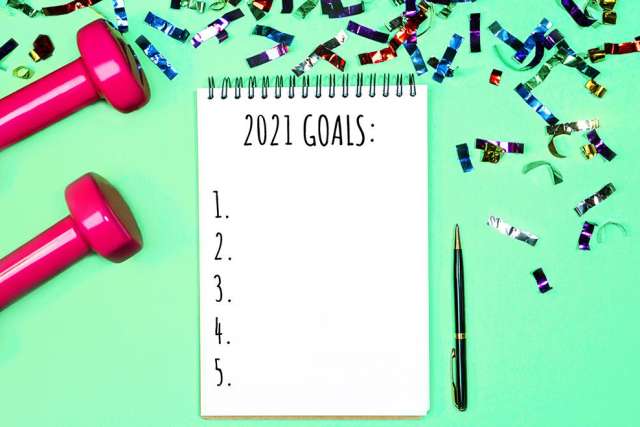Making New Year’s fitness resolutions will be a little more complicated this year than in years past, with social interactions limited and most of the gyms across the nation closed due to COVID-19 restrictions. So how can we make sure we stay committed to our fitness goals?
Dr. Vijaya Surampudi, MD, an endocrinologist at the UCLA Center for Human Nutrition and Deviny Mo, manager of UCLA Health Sports Performance by Exos, provided tips for setting and sticking with your 2021 fitness resolutions.
“When people begin a new journey into fitness, the first thing I advise them to do is to seek support," says Mo. “Nobody can do this journey on their own. You have to find people that can hold you accountable.”
Mo and the staff at UCLA Health Sports Performance specialize in helping clients reach their fitness targets by using a multi-pronged strategy. “We use the four pillars of fitness, which is mindset, nutrition, movement and recovery. These are all pivotal when you’re setting fitness goals,” explains Mo. “The first two are critical because if you’re not eating properly, your diet will affect your mind and your mood. You will begin to hate the fitness process.”
Exos’ “New Year, New You” program helps participants smoothly transition into a fitness routine. A fitness resolution team is in place to help workout warrior newbies adapt to a new fitness and nutrition lifestyle.
Four pillars of fitness
- Mindset: Understanding your goal and plan; training your mind to persevere and stick with the plan.
- Nutrition: Making sure you’re eating the proper foods. Proper nutrition has positive effects on physical durability and mental motivation.
- Movement: Establish a routine. Start slow and build momentum over time.
- Recovery: Make sure you rest and cool down properly after each workout.
Positive effects of fitness and nutrition
The team at the Center for Human Nutrition focuses on the treatment and prevention of obesity, as well as nutrition, phytochemicals and prevention against cardiovascular and metabolic diseases.
"Exercise and nutrition prevent long-term complications,” Dr. Surampudi says. “They both help with reducing cancer risk, cardiovascular disease risk, reverse diabetes/prediabetes and reduce the risk of developing dementia.”
Dr. Surampudi acknowledges the effects of COVID-19 and stay-at-home orders. With gyms closed and many jobs lost, it’s harder for people to remain as physically active as they used to be. Also, eating healthy is no longer an option for many families as they have felt the economy's financial crunch within their households. Nonetheless, she stresses the importance of staying healthy.
“We have to reimagine what we thought about fitness. Yes, the gyms are closed, but we now have to take control of our fitness journey," stresses Dr. Surampudi. “We’re in a time now where we can do physical therapy by way of telemedicine. Fitness trainers and yoga studios have converted to doing workouts via Zoom. There are plenty of workouts we can do in our homes.”
Mo and Dr. Surampudi agree that making time and space available for fitness is important. "You can make space in your living room, and I recommend people get outside and begin enjoying the process,” advises Mo. “If you’re new to the fitness journey, start conservatively. Make a plan to exercise twice a week, 30 minutes a day.”
Fitness is a marathon, not a sprint
Traditionally, millions of people charge into each new year ready to attack their new workout ambitions with vigor and zeal. However, by March, the number is cut in half as many fall away from their commitments. That drop-off has much to do with the masses biting off more than they can chew and not pacing themselves accordingly. Fitness goals are more achievable when you follow a fitness plan and set incremental goals. Following these tips can help you achieve your fitness resolutions:
Tips for reaching 2021 fitness goals
- Find a workout partner or coach (one who can inspire you)
- Write out a fitness and nutrition plan
- Start small with your workouts and build gradually
- Make time and space for fitness (your living room can be your gym)
- Rest after every workout to replenish your body properly
- Switch up your fitness routine to avoid monotony (hiking, yoga, cardio, weight training, etc.)
- Track your progress to stay motivated
- Set up regular consultations with your partner/trainer to stay mentally motivated
- Listen to your body (not every exercise is for every person)
- Don't rush your goals. Take your time and enjoy the process.
To learn more about starting a fitness and nutrition journey, visit the UCLA Sports Performance and UCLA Center for Human Nutrition websites.




